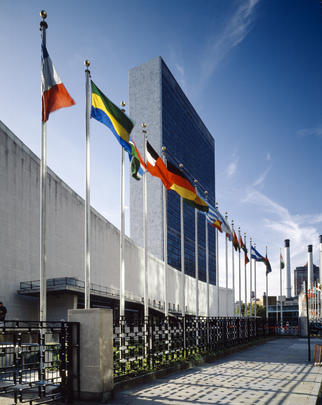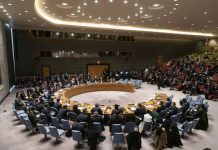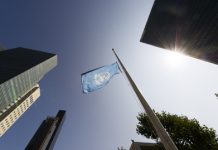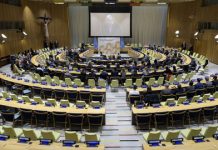Now, with UN support, Mosul has risen from the ashes of war and its historic monuments which had been reduced to rubble, dot the skyline once again.
The devastating nine-month-long battle to liberate the city from the terrorist group killed 10,000 civilians, leaving it in ruins.
In less than seven years, reconstruction has revitalised the city, with robust support from UN agencies and international partners, like Japan, the United Arab Emirates (UAE) and the European Union.
The Al-Nouri Mosque in Mosul was severely damaged in 2017 during the occupation by ISIL.
International cooperation builds lasting legacy
The intensity of the fighting between the terrorists and Iraqi ground forces – supported by US-led coalition airstrikes – left many priceless buildings completely or partially destroyed, including the famous 12th century Al-Nouri Mosque.
UN agencies forged action plans with local authorities and international partners to rebuild the war-torn city.
Teams tackled the enormous challenges, from recycling rubble and removing unexploded bombs, to rebuilding classrooms and centuries-old landmarks while re-energising the Moslawi spirit.
Two girls walk in the ruins of the city of Mosul.
Reviving the spirit of Mosul
The UN Educational, Scientific and Cultural Organization (UNESCO) joined those efforts in 2018, with a budget of $115 million and 15 partners, including the UAE and the European Union.
The Revive the Spirit of Mosul project drafted plans to resurrect historic landmarks, classrooms and homes alongside the vibrant essence of a reborn city.
Learn more about the plans here.
The Al-Nouri Mosque complex in Mosul is due to be rebuilt with support from UNESCO.
Blueprints amid the rubble
The rebuilding plans unfolded at a steady pace.
To document the dramatic transformation, young Iraqi filmmakers set out to track the recovery in a UNESCO-supported video series.
Its 48 episodes captured the human dimension of the city’s rejuvenation, telling the poignant stories of Moslawis alongside their hopes and dreams for their beloved city.
Watch the full series here.
An UNMAS team in war-torn Mosul, Iraq, searches for and clears explosives in the rubble.
Safety comes first
When a conflict ends, unexploded remnants of war must be safely removed as they pose deadly threats long after the guns go silent.
First, safety was ensured for civilians returning to their neighbourhoods.
To address those dangers, a UN Mine Action Service (UNMAS) team was deployed to search for and clear unexploded ordnance among the rubble.
Dealing with 8 million tonnes of debris
To deal with an estimated seven to eight million tonnes of debris created by the battle for Mosul, the UN Environment Programme (UNEP) and the International Organization for Migration (IOM) joined forces in 2021 with local authorities to establish the city’s first debris recycling centre.
“By processing the rubble to produce quality materials that can be used in reconstruction efforts, creating much needed job opportunities for returnees and cleaning-up the urban environment, this initiative practically illustrates how humanitarian needs and sustainable development goals can be addressed in a joint manner,” Dr. Jassim Humadi, Iraq’s Deputy Environment Minister, said at the time.
The local population welcomed the project.
“Young people in our village view debris recycling as a golden chance in terms of job creation, which additionally, by clearing the rubble, is allowing us to return and rebuild our homes,” added Mijbel Mar’i, a 24-year-old day labourer.
Read more about that project here.
Reclaiming unity
Reconstruction is about much more than physical restoration; it is about reclaiming identity and unity.
This conviction lies at the heart of UNESCO efforts to rebuild Mosul’s treasured monuments, including Al-Nouri Mosque and Al-Hadba Minaret.
The project employed more than 7,700 Moslawis and has rehabilitated four religious monuments, 124 historical homes and renovated 404 classrooms.
Read the full report on the project here.
Workers repair part of the Al-Nouri Mosque in Mosul.
‘Watching my city come back to life’
“When I saw the minaret rise again, it was like watching my city come back to life,” said Omar, a young architect.
He was among several local experts that helped meticulously piece together its fragments.
Over 45,000 original bricks have been recovered from Al-Nouri Mosque and Al-Hadba Minaret and cleaned and catalogued for the reconstruction of the latter.
Learn more about this rebuilding effort here.
Beyond bricks and mortar
UN agencies also led projects to rebuild education institutions and other civilian infrastructure damaged or destroyed.
The newly rehabilitated Central Library at Mosul University, Iraq’s second-largest university that serves more than 50,000 students, was officially reopened in 2022 by the UN Development Programme (UNDP).
But, reviving Mosul goes beyond bricks and mortar.
Girls at a primary school in west Mosul, Iraq. (file)
By 2021, damaged or levelled schools were being rebuilt, and the UN Children’s Fund (UNICEF) supported psychosocial training activities for teachers, including at Al Huda Primary School in west Mosul.
UNESCO trained over 5,000 educators and parents in preventing violent extremism, supporting more than 120,000 students.
Moslawis are now free to enjoy their culture and passions, from music to sports, like the Mosul Girls Football Club, founded in 2021 by the Sustainable Peace Foundation with UN migration agency (IOM) support.
In helping to revive the “spirit” of Mosul, UNESCO has demonstrated that culture can play an essential role in post-conflict reconstruction and the promotion of peace.
Source of original article: United Nations (news.un.org). Photo credit: UN. The content of this article does not necessarily reflect the views or opinion of Global Diaspora News (www.globaldiasporanews.net).
To submit your press release: (https://www.globaldiasporanews.com/pr).
To advertise on Global Diaspora News: (www.globaldiasporanews.com/ads).
Sign up to Global Diaspora News newsletter (https://www.globaldiasporanews.com/newsletter/) to start receiving updates and opportunities directly in your email inbox for free.





























